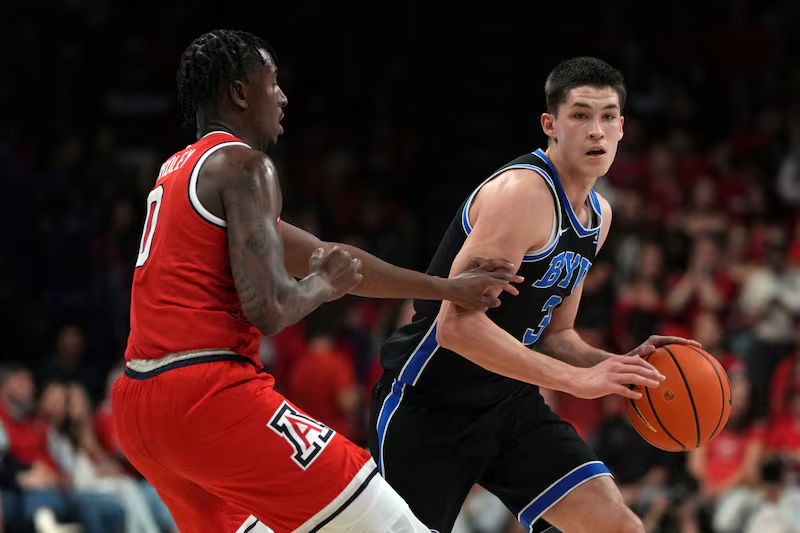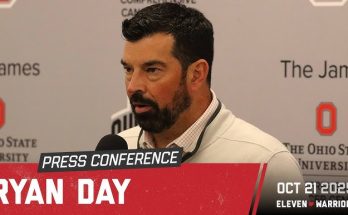In a thrilling encounter on February 22, 2025, the Brigham Young University (BYU) Cougars edged out the No. 19 Arizona Wildcats with a 96-95 victory in Tucson. This win not only extended BYU’s winning streak to four games but also marked their second consecutive triumph over a ranked opponent—a feat the Cougars hadn’t achieved in 37 years.
1. Offensive Prowess and Balanced Scoring
BYU’s offensive efficiency was on full display, with the team shooting an impressive 55.4% from the field and 45.2% from beyond the arc. Five players scored in double figures, showcasing the team’s depth and balanced attack. Richie Saunders led the charge with 23 points, including two clutch free throws with 3.2 seconds remaining that sealed the victory. Egor Demin contributed 13 points and eight assists, while Kanon Catchings and Mawot Mag added 14 and 11 points, respectively.
This offensive outburst was particularly noteworthy given the hostile environment of the McKale Memorial Center. The Cougars’ ability to maintain composure and execute their game plan under pressure speaks volumes about their preparation and resilience. Their shooting percentages reflect a team in sync, making the right reads and capitalizing on scoring opportunities.
2. Defensive Resilience Amid High Stakes
While both teams exhibited offensive firepower—Arizona shot 54.2% from the field and 45.5% from three-point range—BYU’s defense made crucial stops when it mattered most. Caleb Love was a standout for the Wildcats, scoring 27 points and making pivotal plays in the final minute to temporarily give Arizona the lead. However, the Cougars’ defense held firm in the closing moments, with Saunders intercepting an inbound pass near midcourt after his game-winning free throws, preventing Arizona from attempting a final shot.
The defensive tenacity displayed by BYU, especially in high-pressure situations, underscores their commitment to a holistic game approach. Their ability to disrupt Arizona’s offensive rhythm at critical junctures was instrumental in securing the win.
3. Controversial Conclusion and Post-Game Tensions
The game’s climax was not without controversy. In the final seconds, a foul was called on Arizona’s Trey Townsend as he defended Saunders, leading to the decisive free throws. The call was met with disapproval from the Arizona crowd, and Wildcats’ head coach Tommy Lloyd expressed his frustration post-game, stating, “It’s a bad call. I mean like, whatever. What am I going to say? You hate for a game to be decided by that.”
The tension extended beyond the final buzzer. During the postgame handshake, players from both teams had to be separated due to escalating emotions. Additionally, some Arizona fans directed an offensive chant at the BYU team, referencing the university’s affiliation with the Church of Jesus Christ of Latter-day Saints. Arizona’s athletic director, Desireé Reed-Francois, promptly issued an apology, emphasizing that the chant was “not reflective of who we are and should not have happened.”
These incidents highlight the intense emotions that can accompany closely contested games, especially when controversial officiating decisions play a pivotal role. They also underscore the importance of sportsmanship and respect among players and fans alike.
Historical Context and Implications
This victory is significant in the broader context of BYU’s basketball history. Achieving back-to-back wins against ranked opponents for the first time in nearly four decades signals a resurgence for the program. First-year head coach Kevin Young has been instrumental in this turnaround, instilling a culture of confidence and resilience. Reflecting on the team’s progress, Young noted, “Our guys have bought into the system, and we’re seeing the results on the court. It’s a testament to their hard work and dedication.”
The win also bolsters BYU’s resume as they aim for postseason play. Victories against ranked teams enhance their tournament prospects and position them favorably within the Big 12 Conference standings. As the season progresses, maintaining this momentum will be crucial for securing a favorable seed and making a deep postseason run.
Looking Ahead
BYU’s recent performances have set a high standard for the remainder of the season. The team’s balanced scoring, defensive resilience, and ability to perform under pressure are attributes that bode well for future challenges. However, consistency will be key. The Cougars must continue to refine their game, address any defensive lapses, and ensure that they remain focused amid increasing external expectations.
The upcoming schedule presents opportunities for BYU to further solidify their standing. Matchups against conference rivals and other ranked opponents will test the team’s mettle. Embracing these challenges with the same determination and poise exhibited against Arizona will be essential for sustained success.
BYU’s narrow victory over No. 19 Arizona serves as a testament to the team’s growth, resilience, and competitive spirit. The game encapsulated the highs and lows of college basketball, from offensive showcases to defensive stands, culminating in a contentious yet defining moment. As the Cougars look ahead, building upon these experiences will be vital in navigating the remainder of the season and achieving their postseason aspirations.
The Broader Impact of Ben Christman’s Passing
The sudden and tragic passing of Ben Christman has not only affected those who knew him personally but has also sparked a nationwide conversation about the physical and mental health of collegiate athletes. His story is a painful reminder that even elite athletes—who appear to be in peak physical condition—are not immune to hidden medical conditions or unexpected health complications.
In response to Christman’s passing, conversations are emerging around improving medical screenings, providing better resources for players’ mental and emotional well-being, and ensuring that collegiate athletic programs offer the best possible care for their athletes. The impact of his death extends beyond his teammates and coaches—his story has resonated with fans, fellow athletes, and sports organizations nationwide.
Support from the Football Community
Since news of Christman’s passing broke, support has poured in from across the football world. Coaches, players, analysts, and fans have all shared their condolences and reflections on social media, emphasizing the brotherhood that exists within the sport.
Former Ohio State coach Ryan Day, who initially recruited Christman, shared:
“Ben was a phenomenal young man who had a bright future ahead of him. He worked hard, treated people with respect, and gave everything he had to the game. We are heartbroken by this loss.”
NFL players have also weighed in, with former Buckeyes and Wildcats who made it to the professional level paying tribute to Christman. Cleveland Browns offensive lineman Wyatt Teller, who played at Virginia Tech but followed Christman’s career closely, posted on Twitter:
“Heartbreaking news about Ben Christman. A young man with so much talent and potential. Prayers up for his family and all his teammates.”
The outpouring of support demonstrates how deeply connected the football community is, and it serves as a testament to Christman’s character and the relationships he built throughout his career.
The Next Steps for UNLV, Kentucky, and Ohio State
Each of the programs Christman was a part of—UNLV, Kentucky, and Ohio State—has vowed to honor his legacy in meaningful ways. UNLV has already announced that they will dedicate their upcoming spring practice and a portion of their 2025 season in his memory, with plans to wear helmet decals featuring his initials.
At Kentucky, where he spent two years, a moment of silence is expected to take place before their first home game of the 2025 season. The school has also indicated they will establish an annual award in Christman’s name, recognizing a player who exemplifies the toughness, resilience, and leadership that he brought to the program.
Ohio State, where his college career began, has also expressed a desire to keep his memory alive. Players and staff have been seen wearing wristbands with his initials, and the university is in discussions about hosting a memorial event to celebrate his life.
A Call for Change in Collegiate Athletics
While the cause of Christman’s death is still under investigation, his passing has intensified calls for increased medical testing in collegiate sports. Many experts argue that standard physicals and electrocardiograms (EKGs) may not be enough to detect underlying heart conditions or other potential health risks in athletes.
Some schools have already begun reevaluating their health protocols in the wake of Christman’s death. There is growing support for more in-depth cardiac screenings, including echocardiograms, for all student-athletes before they participate in competitive play. Organizations such as the National Collegiate Athletic Association (NCAA) and the American College of Sports Medicine are being urged to review their policies to ensure players receive the best possible medical evaluations.
Additionally, Christman’s death has reignited discussions about mental health support for student-athletes. The pressures of balancing academics, athletics, and personal challenges can be overwhelming, and many athletes struggle in silence. Colleges are now being encouraged to provide more comprehensive mental health resources, including increased access to sports psychologists and counselors.
Remembering Ben Christman’s Spirit
Despite his sudden and tragic departure, Ben Christman’s impact will continue to be felt for years to come. His journey—from a dominant high school player in Ohio to a hardworking, dedicated college athlete—was one of perseverance and passion. Those who knew him describe him as a person who lit up every room he entered, a teammate who always had others’ backs, and an athlete who was committed to the game he loved.
As his family, teammates, and fans mourn his loss, they also celebrate the legacy he leaves behind. Whether through scholarships in his name, changes in medical policies for athletes, or simply the memories shared by those who knew him best, Ben Christman’s story will not be forgotten.

